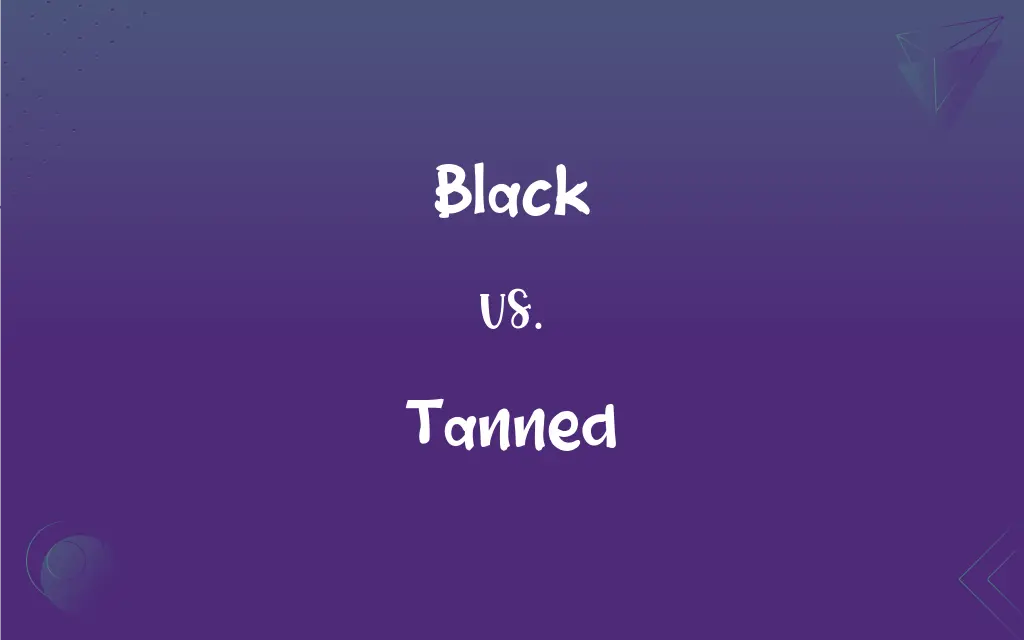Black vs. Tanned: What's the Difference?
Edited by Harlon Moss || By Janet White || Published on December 10, 2023
Black is a color with no hue, often associated with darkness, while tanned refers to darkened skin due to sun exposure.

Key Differences
Black is the darkest color, absorbing all light and not reflecting any, often symbolizing mystery or sophistication. Tanned, on the other hand, describes skin that has darkened due to sun exposure, often associated with health or leisure.
In fashion, black is a versatile color, used for its slimming effect and elegance. Tanned, in contrast, may refer to leather or skin that has undergone a tanning process, resulting in a brownish hue.
Black can represent power and formality in many cultures, being a common choice for formal attire. Tanned skin is sometimes perceived as a sign of an active, outdoor lifestyle, especially in cultures where it indicates leisure time spent outdoors.
In art and design, black is used to convey depth, contrast, and emphasis. Tanned, as an adjective, can describe the warm, golden-brown appearance of certain materials, like tanned leather or wood.
The concept of black extends beyond color to encompass ideas like the unknown or the absence of light. Tanned, as a term, is more specific, primarily relating to the change in skin color or the treatment of materials.
ADVERTISEMENT
Comparison Chart
Basic Definition
A color with no hue, absorbing all light
Darkening of skin or material due to exposure
Symbolism
Mystery, elegance, formality
Health, leisure, natural appearance
Use in Fashion
Versatility, slimming effect
Describes sun-exposed skin or treated materials
Cultural Perception
Power, sophistication
Active, outdoor lifestyle
Application
Depth, contrast in art and design
Golden-brown hue of materials
ADVERTISEMENT
Black and Tanned Definitions
Black
Used to denote darkness or the absence of light.
The room was pitch black when the power went out.
Tanned
Having a warm, golden-brown appearance.
The tanned wood of the table added a rustic charm to the room.
Black
The darkest color, absorbing all visible light.
The artist chose black to create a stark contrast in the painting.
Tanned
Skin darkened by exposure to the sun.
After a week at the beach, her skin was beautifully tanned.
Black
Often associated with elegance and sophistication.
She wore a black dress to the gala for its classic elegance.
Tanned
Leather or material that has been treated to achieve a brownish color.
The tanned leather boots were perfect for hiking.
Black
Representing power and formality in cultural contexts.
He wore a black suit to the formal meeting.
Tanned
The process or result of changing color through exposure.
The tanned sails of the boat showed years of sea and sun.
Black
Symbolizing mystery or the unknown.
The black night sky was filled with stars.
Tanned
Associated with health and an active outdoor lifestyle.
His tanned complexion suggested he spent a lot of time outdoors.
Black
Being of the color black, producing or reflecting comparatively little light and having no predominant hue.
Tanned
To convert (an animal hide) into leather by subjecting it to a chemical process that stabilizes the proteins, making it less susceptible to decay.
Black
Having little or no light
A black, moonless night.
Tanned
To make (a person or a person's skin) darker by exposure to the sun.
FAQs
Why is black commonly used in formal attire?
Black is used in formal attire for its elegance and ability to convey sophistication and seriousness.
How does black affect room design?
In room design, black can add depth and focus, but too much black may make a space feel smaller or darker.
Can tanning be harmful to the skin?
Excessive sun exposure during tanning can be harmful and increase the risk of skin damage.
Is tanned leather environmentally friendly?
The environmental impact of tanned leather depends on the tanning process used; some methods can be more eco-friendly than others.
What is sunless tanning?
Sunless tanning involves using products to achieve a tanned look without sun exposure.
Is black considered a color in art?
In art, black is often considered a color for its ability to create contrast and depth.
Is black a good color for heat absorption?
Yes, black absorbs more heat compared to lighter colors, making it effective for heat absorption.
How is leather tanned?
Leather is tanned using chemical or natural treatments to make it durable and give it color.
Does a tanned skin tone fade?
Yes, a tanned skin tone will gradually fade as skin cells naturally renew.
Are there health benefits to tanning?
Moderate sun exposure for tanning can increase Vitamin D levels, but excessive exposure can be harmful.
Does black clothing have practical benefits?
Black clothing can be practical as it doesn't show stains easily and is versatile for various occasions.
Is black ink the same as other black materials?
Black ink has similar properties to other black materials but is formulated specifically for writing and printing.
Can tanning occur without direct sunlight?
Tanning can occur with indirect sunlight or through artificial UV sources like tanning beds.
Why is black often associated with mourning?
Black is associated with mourning in many cultures due to its somber and serious tone.
How long does a natural tan last?
A natural tan typically lasts a few weeks, depending on skin regeneration and sun exposure.
Is indoor tanning safer than outdoor tanning?
Indoor tanning can still pose risks, as it exposes the skin to UV radiation, similar to outdoor tanning.
Can black be used to create a minimalist look?
Yes, black can be used effectively in minimalist designs for its simplicity and clean lines.
Why is black a popular color in fashion?
Black is popular in fashion for its versatility, slimming effect, and timeless elegance.
What does a tanned appearance indicate in different cultures?
In some cultures, a tanned appearance indicates health and leisure, while in others, it might be associated with manual labor.
Are there different shades of black?
Yes, there are various shades of black, each with a slightly different tone or intensity.
About Author
Written by
Janet WhiteJanet White has been an esteemed writer and blogger for Difference Wiki. Holding a Master's degree in Science and Medical Journalism from the prestigious Boston University, she has consistently demonstrated her expertise and passion for her field. When she's not immersed in her work, Janet relishes her time exercising, delving into a good book, and cherishing moments with friends and family.
Edited by
Harlon MossHarlon is a seasoned quality moderator and accomplished content writer for Difference Wiki. An alumnus of the prestigious University of California, he earned his degree in Computer Science. Leveraging his academic background, Harlon brings a meticulous and informed perspective to his work, ensuring content accuracy and excellence.

































































